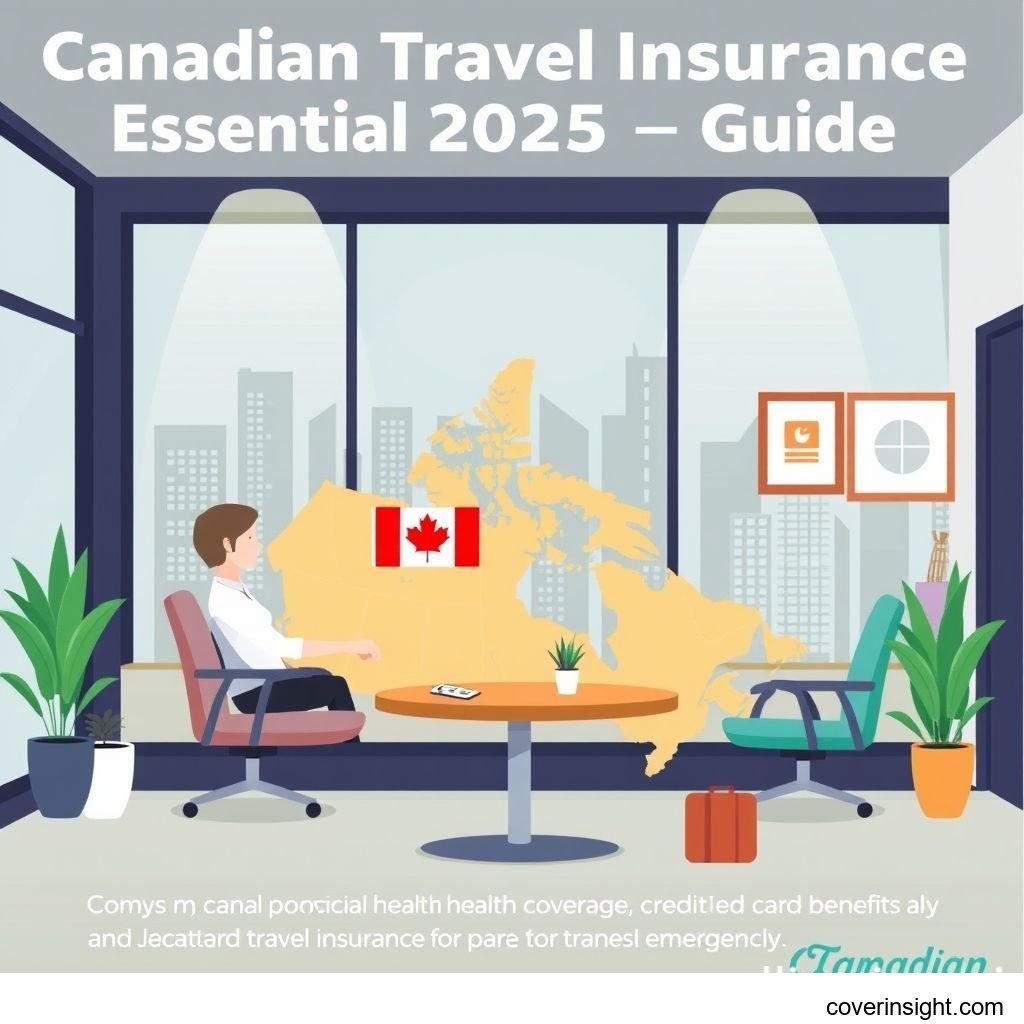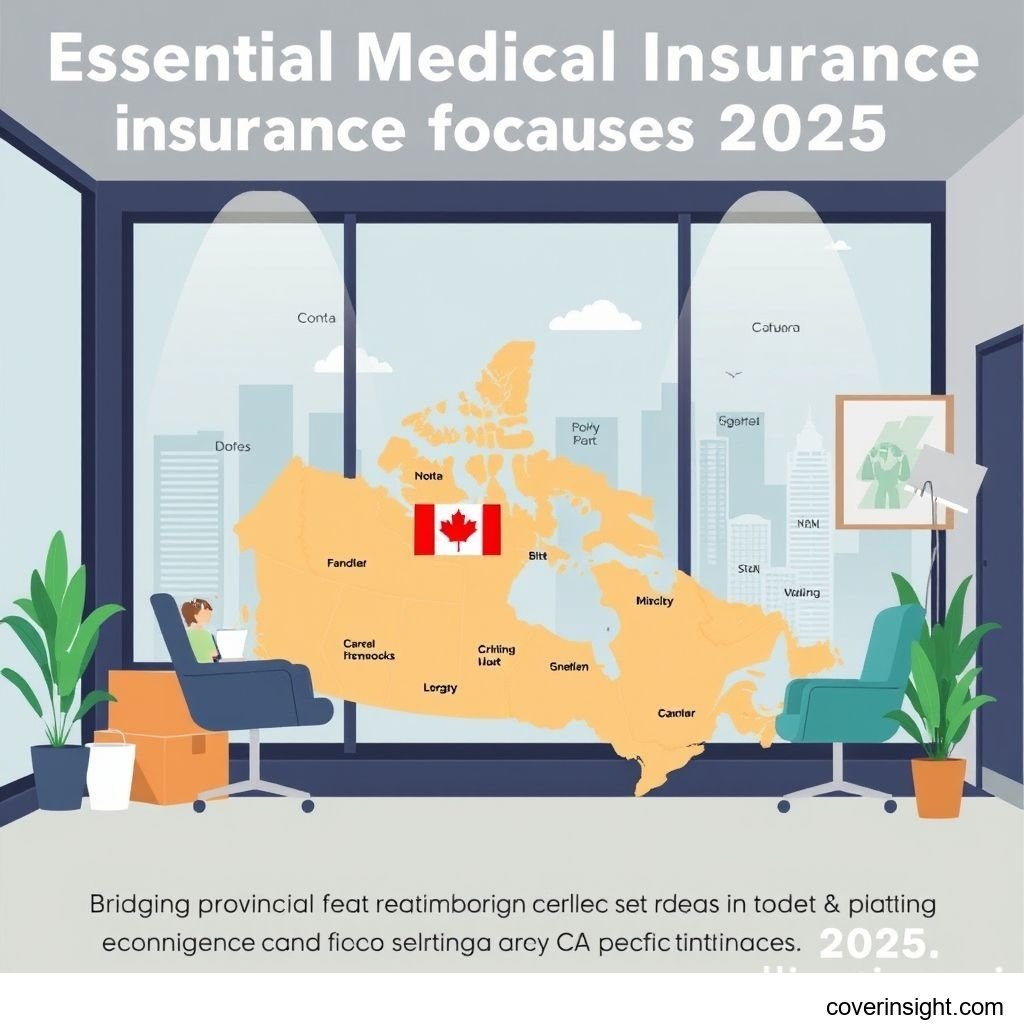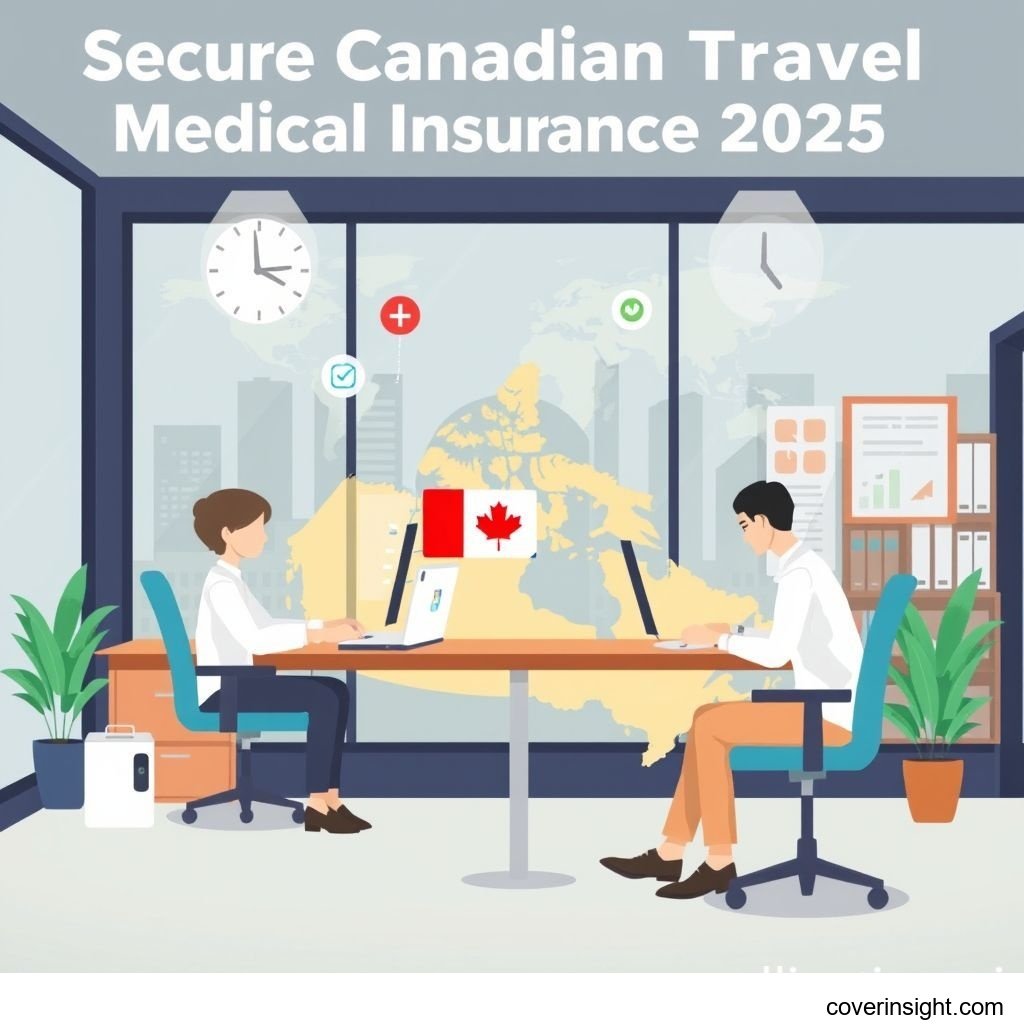Canadian Travel Medical Insurance: Essential 2025 Guide
In 2025, planning international travel from Canada requires more than just booking flights and accommodation. Understanding your healthcare options abroad is paramount. While the allure of exotic destinations or reconnecting with loved ones overseas is strong, the reality of unexpected medical emergencies can quickly turn a dream trip into a financial nightmare. That's where robust medical insurance for international travel becomes an indispensable part of your itinerary. This guide aims to provide a comprehensive overview for Canadians, ensuring you are well-prepared for any health-related challenges that may arise outside the country's borders. Without adequate coverage, travellers risk facing exorbitant out-of-pocket expenses for emergency treatment, hospital stays, or even medical evacuation, making medical insurance for international travel not just a convenience, but a critical necessity.
Coverage Details
Securing the right medical insurance for international travel means understanding precisely what it covers and, equally important, what it does not. Policies can vary significantly, so a thorough review is always recommended before you depart.
What’s Included
Most comprehensive medical insurance for international travel policies are designed to cover unforeseen medical emergencies that occur while you are abroad. Key inclusions typically feature:
-
Emergency Medical Treatment: Coverage for sudden and unexpected illnesses or injuries requiring immediate medical attention. This includes doctor's visits, diagnostic tests (X-rays, lab work), and prescription medications.
-
Hospitalization: Costs associated with hospital stays, including room and board, nursing care, and intensive care if necessary.
-
Ambulance Services: Emergency transportation to the nearest appropriate medical facility, whether by ground or air ambulance.
-
Emergency Medical Evacuation: If you require specialized medical care unavailable locally, or if your condition necessitates transfer to a facility closer to home, this coverage pays for the medically supervised transport.
-
Repatriation of Remains: In the unfortunate event of death abroad, the policy may cover the costs of preparing and returning the remains to Canada.
-
Emergency Dental Treatment: Coverage for sudden and acute dental pain or injury, often limited to a specific amount.
-
Accidental Death and Dismemberment (AD&D): Compensation paid to beneficiaries in case of accidental death or significant loss of limb/sight.
It's crucial to confirm the specific limits and conditions for each of these benefits with your chosen provider.
Common Exclusions
While policies offer extensive protection, certain situations and conditions are typically excluded. Being aware of these can prevent future claim denials:
-
Pre-existing Conditions: Often, unstable or undiagnosed pre-existing medical conditions are excluded, especially if they have not been stable for a defined period (e.g., 90-180 days) prior to departure. Some policies offer riders for stable conditions.
-
Elective Procedures: Any non-emergency medical treatment, cosmetic surgery, or procedures that could reasonably be postponed until your return to Canada are generally not covered.
-
High-Risk Activities: Participation in extreme sports or dangerous activities (e.g., heli-skiing, bungee jumping, skydiving) may be excluded unless specific add-ons are purchased.
-
Travel Against Advisories: If you travel to a region for which the Canadian government has issued a "avoid non-essential travel" or "avoid all travel" advisory, your policy may be void.
-
Mental Health Conditions: Coverage for mental health emergencies can be limited or excluded, varying by provider.
-
Alcohol or Drug-Related Incidents: Injuries or illnesses sustained while under the influence of alcohol or non-prescribed drugs are almost universally excluded.
-
Acts of War or Terrorism: While some policies may offer limited coverage for such events, they are frequently excluded.
Always read the policy wording (also known as the certificate of insurance) carefully to understand all exclusions before purchasing.
Understanding Provincial Health Coverage Abroad
A common misconception among Canadian travellers is that their provincial health coverage abroad will sufficiently protect them during international trips. This is largely untrue and can lead to severe financial hardship.
Why Provincial Coverage Isn't Enough
While your provincial health plan (like OHIP in Ontario, BC MSP, or Alberta Health Care) provides coverage within Canada, its reach outside the country is extremely limited. Here’s why provincial health coverage abroad falls critically short:
-
Limited Reimbursement: Provincial plans typically reimburse only a small fraction of the actual cost of medical services rendered outside Canada. For instance, an emergency appendectomy that costs tens of thousands of dollars in the U.S. might only be reimbursed for a few hundred dollars by your provincial plan.
-
No Out-of-Pocket Payment: Foreign medical providers often require immediate payment for services. Your provincial health card is not recognized as a form of payment abroad. You would be expected to pay upfront and then seek reimbursement later, which can be a significant burden.
-
Exclusions for Non-Emergency Services: Most provincial plans offer no coverage for services that are not deemed immediate emergencies, or for repatriation costs.
-
Geographical Limitations: The coverage is strictly bound by Canadian borders. Even for "emergencies," the definition and scope are very narrow compared to a dedicated medical insurance for international travel policy.
Relying solely on provincial health coverage abroad is a risky gamble that no prudent traveller should take. For a deeper understanding of these limitations, the Financial Consumer Agency of Canada offers valuable resources.
Cost Analysis
The cost of medical insurance for international travel is not one-size-fits-all. Several variables influence the premium you will pay, and understanding these factors can help you find a policy that fits both your needs and your budget.
Price Factors
When an insurer calculates your premium for medical insurance for international travel, they consider a range of elements:
-
Age: This is arguably the most significant factor. As individuals age, the likelihood of medical issues increases, leading to higher premiums for older travellers.
-
Trip Duration: A longer trip inherently carries more risk, so policies covering extended periods will cost more than those for short vacations.
-
Destination: Healthcare costs vary dramatically around the world. Travel to countries with high medical expenses, like the United States, will result in higher premiums than travel to regions with lower costs.
-
Health Status and Medical History: Pre-existing conditions, especially unstable ones, can significantly increase your premium or even make certain coverage unavailable. Some insurers require a medical questionnaire.
-
Coverage Amount and Deductibles: Policies with higher maximum coverage limits (e.g., $5 million vs. $1 million) will cost more. Conversely, choosing a higher deductible (the amount you pay out-of-pocket before insurance kicks in) can lower your premium.
-
Type of Policy: Single-trip policies are priced per trip, while annual multi-trip policies can offer better value for frequent travellers.
Saving Tips
While you shouldn't compromise on essential coverage, there are smart ways to potentially reduce the cost of your medical insurance for international travel:
-
Purchase Early: While not always offering a direct discount, buying your policy well in advance ensures you get the best rates before potential price increases and gives you time to review and understand your coverage.
-
Compare Quotes: Don't settle for the first quote you receive. Use online comparison tools or consult with a travel insurance broker to shop around among multiple providers.
-
Consider Annual Multi-Trip Policies: If you plan to travel internationally more than once in a year, an annual policy is often more cost-effective than purchasing multiple single-trip policies.
-
Increase Your Deductible: If you have a financial buffer, opting for a higher deductible can lower your premium. Just be prepared to pay that amount if a claim arises.
-
Bundle Policies: Some insurers offer discounts if you bundle your travel medical insurance with other types of insurance, like trip cancellation or interruption.
-
Review Existing Coverage: Before buying, check if you already have some coverage through your employee benefits, professional associations, or credit card travel insurance.
Leveraging Credit Card Travel Insurance
Many Canadians mistakenly believe that their credit card travel insurance provides sufficient coverage for all their international travel medical needs. While useful, it’s crucial to understand its limitations and how it complements (or falls short of) a dedicated policy.
Assessing Your Credit Card Travel Insurance
Credit cards, particularly premium ones, often include various travel insurance benefits. However, credit card travel insurance is typically supplementary and comes with specific conditions and limitations that can leave significant gaps in your protection:
-
Limited Coverage Amounts: The medical coverage provided by credit card travel insurance might have lower maximum limits compared to dedicated policies, which may not be enough for serious medical emergencies in high-cost countries like the USA.
-
Age Restrictions: Many credit card policies have strict age cut-offs (e.g., no coverage for travellers over 65 or 75), or significantly reduced coverage for older cardholders.
-
Trip Duration Limits: There are often maximum trip duration limits (e.g., 15 or 30 days). For longer trips, the credit card travel insurance becomes invalid beyond that period, requiring you to purchase an extension or a separate policy.
-
Activation Requirements: Often, the full cost of your trip (or a significant portion) must be charged to that specific credit card for the insurance to be valid.
-
Pre-existing Condition Clauses: These are often stricter than those found in stand-alone policies, with shorter stability periods or more rigid definitions.
-
Exclusions and Gaps: Credit card travel insurance may not cover certain types of activities, specific medical conditions, or may lack provisions for emergency medical evacuation or repatriation, which are critical components of comprehensive medical insurance for international travel.
Always read your credit card's certificate of insurance carefully or call the benefits administrator to understand exactly what is covered and what isn't, especially when it comes to medical insurance for international travel. It often serves best as a supplemental layer rather than a complete solution. For authoritative information on choosing the right coverage, refer to resources like the Insurance Bureau of Canada.
Choosing Your Policy: A Step-by-Step Guide
Selecting the best medical insurance for international travel requires careful consideration of your personal circumstances and travel plans. It's not a decision to be rushed.
Assessing Your Needs
Before you even start looking at providers, take the time to evaluate what kind of coverage you truly need:
-
Frequency of Travel: Are you a one-time traveller or a frequent flyer? A single-trip policy might suffice for a one-off vacation, but an annual multi-trip policy could be more economical for multiple journeys.
-
Destinations: Where are you going? Healthcare costs vary wildly by region. Travel to the U.S. or Western Europe typically warrants higher coverage limits.
-
Activities Planned: Will you be engaging in any adventure sports (e.g., scuba diving, climbing, skiing)? Many standard policies exclude these, requiring an add-on.
-
Your Health Status: Be honest about your pre-existing conditions. If you have any, you'll need a policy that offers specific coverage for them, or ensures they are stable according to the insurer's criteria. Failure to disclose can void your coverage.
-
Duration of Stay: For longer trips, ensure the policy covers the entire duration and doesn't have a maximum stay limit that you might exceed.
Comparing Providers
Once you know your needs, you can begin comparing different insurers. There are numerous providers offering medical insurance for international travel in Canada.
-
Online Aggregators: Websites that allow you to compare quotes from multiple insurers side-by-side are a good starting point.
-
Insurance Brokers: Brokers can provide personalized advice and help you navigate complex policy wordings, often having access to policies not readily available online.
-
Direct Insurers: You can also approach individual insurance companies directly for quotes.
When comparing, look beyond just the price. Consider these factors:
-
Reputation and Customer Service: Read reviews and check the insurer's ratings for claims processing and customer support.
-
Policy Wording: This cannot be stressed enough. The "fine print" defines exactly what you are covered for, what the exclusions are, and the claims process. Understand the definitions of "emergency," "pre-existing condition," and any stability periods required.
-
Emergency Assistance Services: Does the insurer offer 24/7 multilingual emergency assistance? This is crucial if you need help finding medical care abroad.
-
Deductibles and Coverage Limits: Ensure the coverage limits are high enough for your destination and that the deductible is manageable.
Making an informed choice for your medical insurance for international travel is key to enjoying peace of mind on your trip. For more general insurance resources, consider visiting Insurance Resources Global.
Making a Claim
Even with the most comprehensive medical insurance for international travel, the true test of your policy comes if you need to file a claim. Understanding the process can significantly streamline your experience during a stressful time.
Steps for Filing a Claim
If you experience a medical emergency abroad, follow these steps to ensure a smooth claim process for your medical insurance for international travel:
-
Contact Your Insurer Immediately: This is often the most critical step. Most policies require you to contact their emergency assistance line before seeking non-life-threatening medical care or undergoing significant treatment. They can direct you to approved medical facilities, arrange for direct billing (so you don't pay out-of-pocket), and guide you through the next steps. Keep their emergency contact number readily accessible.
-
Gather All Documentation: Collect and keep meticulous records of everything. This includes:
-
Medical reports, diagnosis, and treatment plans from doctors.
-
Itemized hospital bills and receipts for all medical services, prescriptions, and supplies.
-
Proof of payment (credit card statements, bank transfers).
-
Any police reports if the injury was due to an accident or theft.
-
Your travel itinerary and proof of travel dates.
-
Communication records with your insurer.
-
-
Complete Claim Forms Accurately: Your insurer will provide claim forms. Fill them out completely and accurately, providing all requested information and attaching all supporting documents.
-
Follow Up: Keep a record of all correspondence with your insurer, including dates, names of representatives, and summaries of conversations. Follow up periodically on the status of your claim.
A proactive approach and meticulous record-keeping are essential for a successful claim on your medical insurance for international travel. You can also find more detailed information and guidance on Canadian insurance matters at CA Insurance Home.
FAQs
Navigating the world of travel insurance can bring up many questions. Here are answers to some of the most frequently asked questions regarding medical insurance for international travel for Canadians.
-
How much does medical insurance for international travel cost?
The cost varies widely based on factors such as your age, the duration of your trip, your destination, your health status, and the amount of coverage you choose. It can range from a few tens of dollars for a short trip for a young, healthy individual to hundreds or even thousands for longer trips, older travellers, or those with pre-existing conditions.
-
What affects premiums?
Premiums are primarily affected by: your age (older travellers typically pay more), the length of your trip, where you are travelling (e.g., U.S. travel is generally more expensive), your health history and any pre-existing medical conditions, and the deductible amount you choose.
-
Is it mandatory?
While it is not legally mandatory for Canadians to purchase medical insurance for international travel before leaving the country, it is highly recommended. Many countries or cruise lines may require proof of insurance for entry or participation. More importantly, it is financially irresponsible to travel internationally without it, given the high cost of foreign medical care.
-
How to choose?
To choose the right policy, assess your personal needs (age, health, destination, activities), compare quotes from multiple reputable providers, thoroughly read the policy wording for exclusions and limitations, and ensure the coverage limits are adequate for your destination. Pay close attention to pre-existing condition clauses and emergency assistance services.
-
What are the consequences of no coverage?
Travelling without medical insurance for international travel means you are personally responsible for 100% of any medical expenses incurred abroad. This could include tens of thousands of dollars for a single hospital stay, emergency surgery, or medical evacuation. Such costs can lead to significant debt, financial ruin, or even prevent you from receiving necessary care if you cannot pay upfront.
Conclusion
As you plan your adventures for 2025, remember that securing robust medical insurance for international travel is just as important as your passport and tickets. While provincial health coverage abroad offers minimal protection, and credit card travel insurance often comes with significant limitations, a dedicated policy provides essential peace of mind. It ensures that should an unexpected illness or injury occur, you will receive the necessary care without facing devastating financial consequences. Invest wisely in your health and security abroad; it's the smartest choice any Canadian traveller can make.








Comments